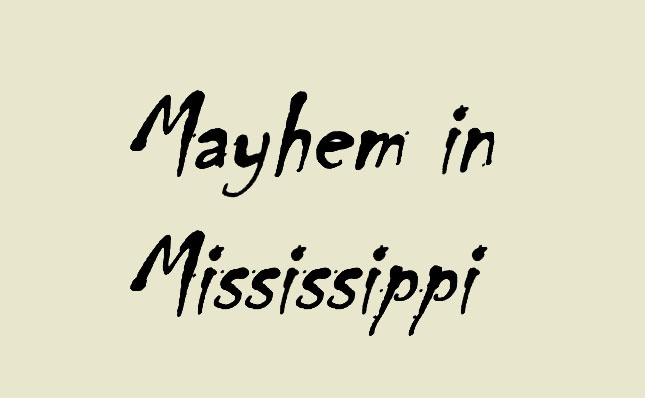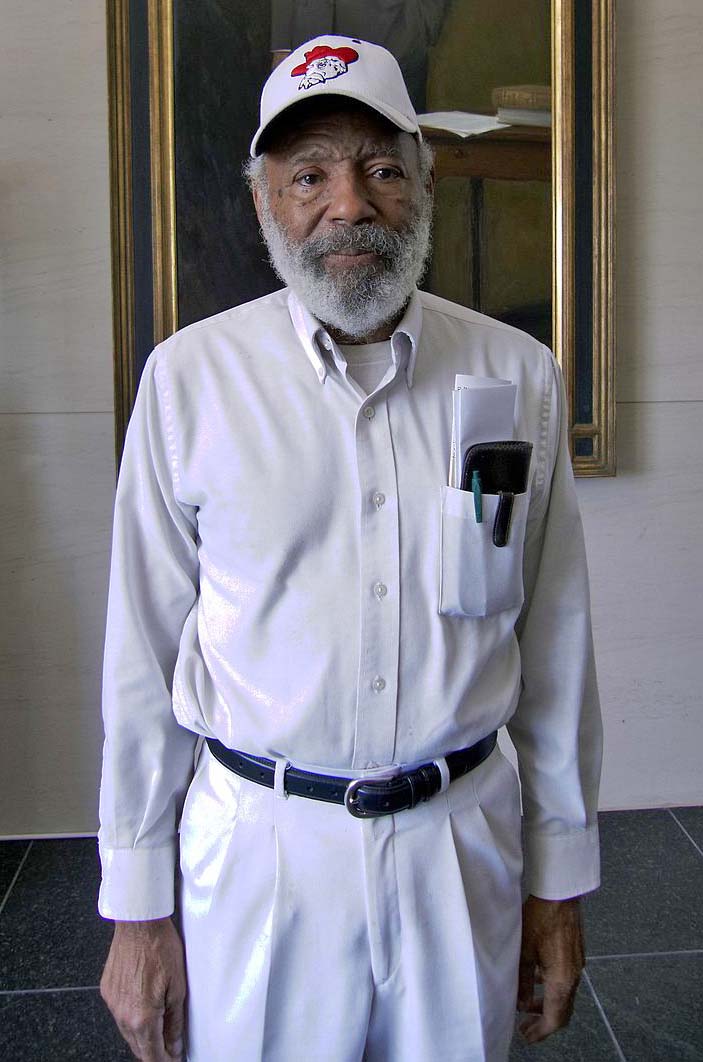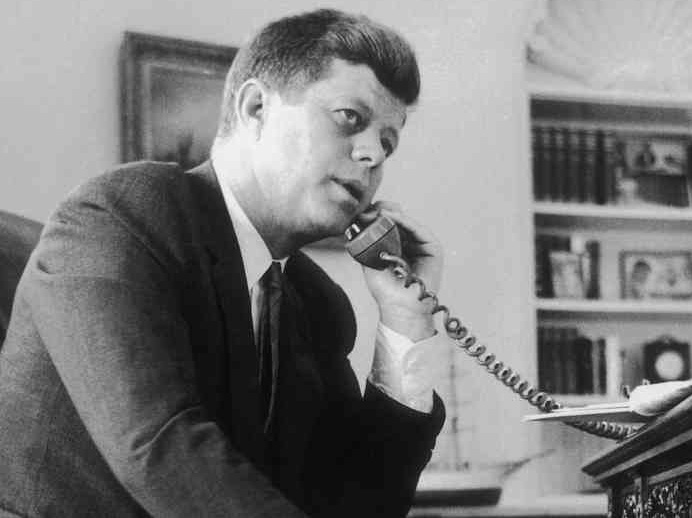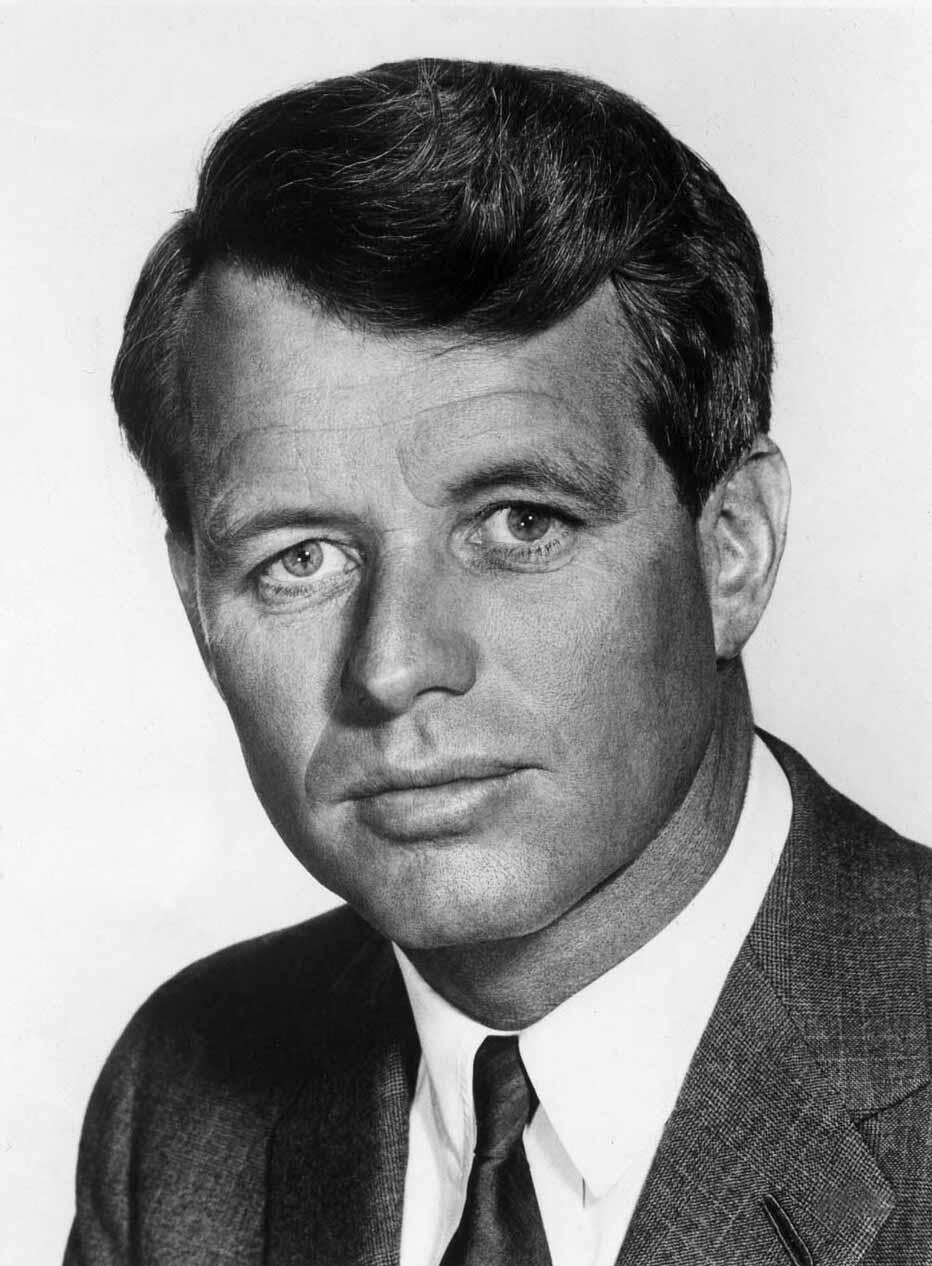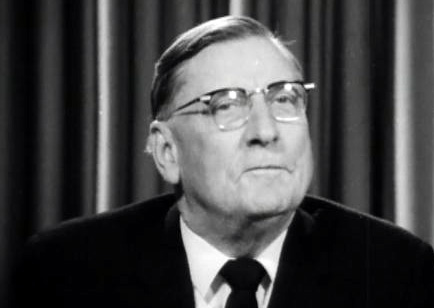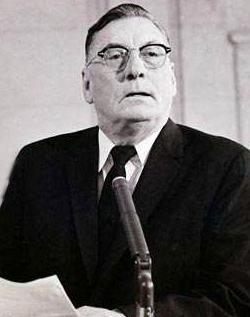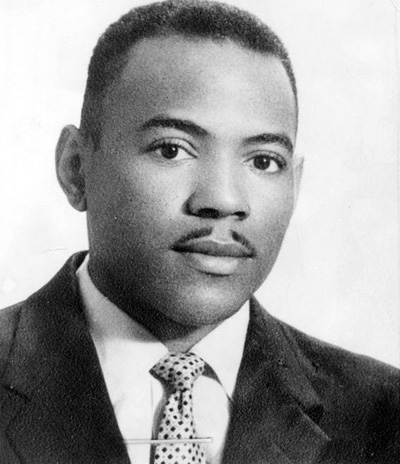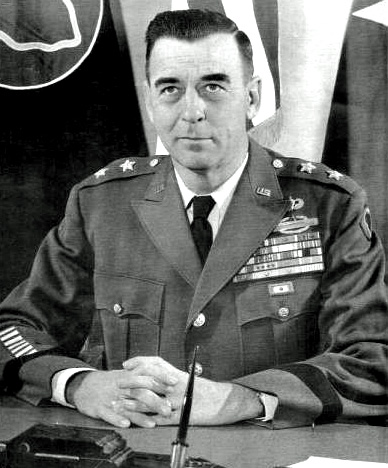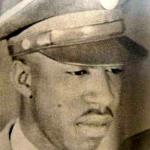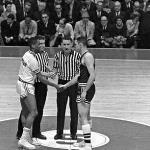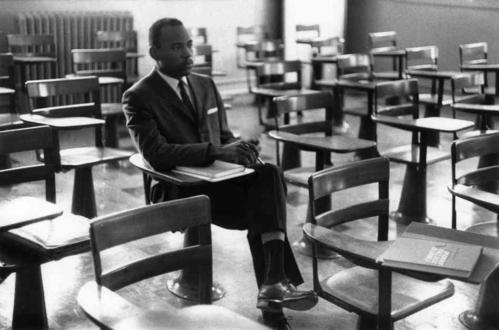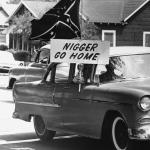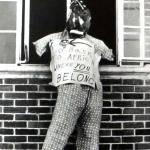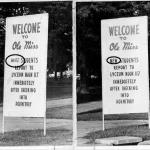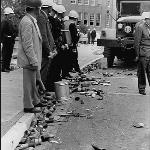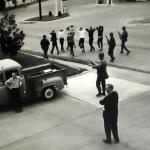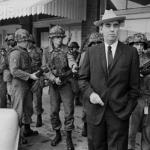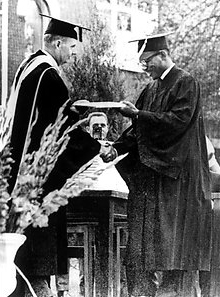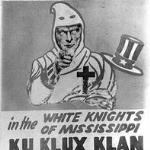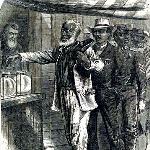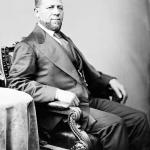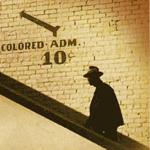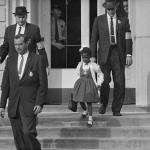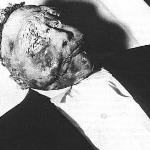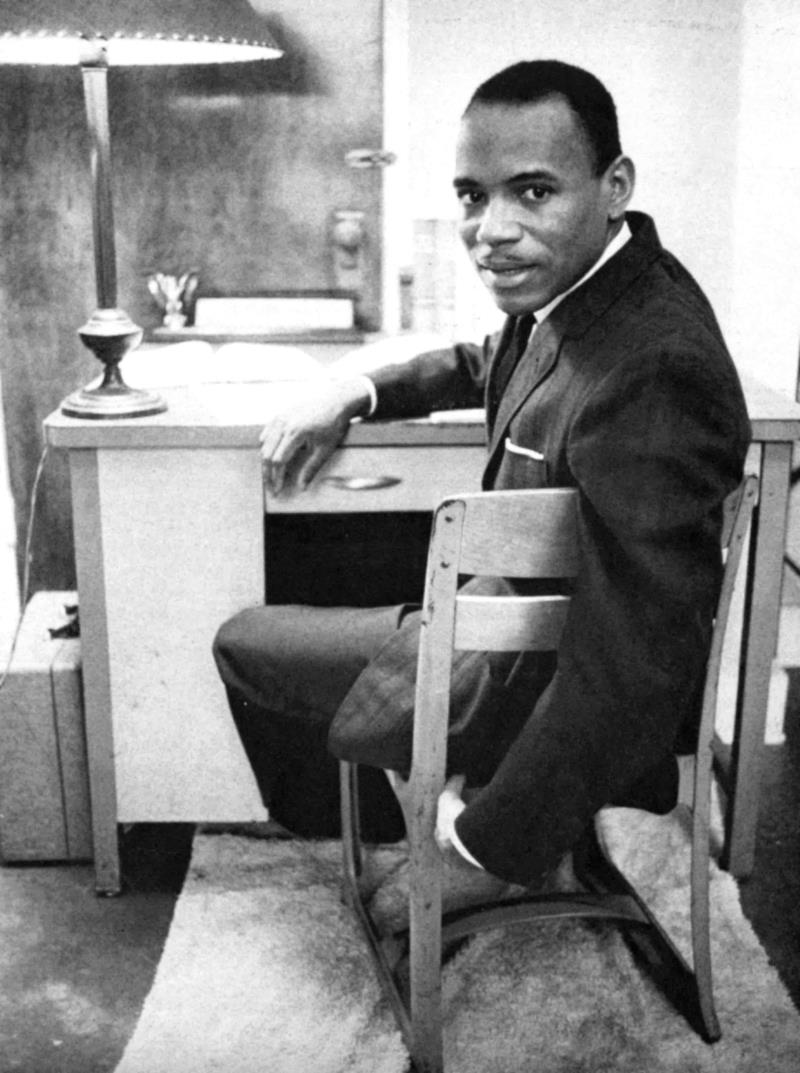 | ||||||
“The saddest day of the week for me is Thursday, because that’s ROTC day. When I go to class that morning, the Reserve Officer Candidates have on their uniforms. In the afternoon, I often go out to watch them drill up and down the streets near my dormitory. I know that not one Negro in Mississippi has the privilege of taking part in the ROTC program. Surely, there’s one Negro in our state who would make officer material.”
James Meredith (left) with civil rights leader Medgar Evers. Evers, who had applied to Ole Miss law school in 1954 and was 'mysteriously denied,' would mentor Meredith through the thorny process of admission. When Meredith was denied despite being qualified, Evers would bring in the full weight of the NAACP legal team to attack the problem. This time Ole Miss would not be allowed to wiggle out.
Governor Ross Barnett - "Never, Never, Never!"
James Meredith was an independent sort who, despite fighting for the cause of civil rights did not want to be involved with the non-violent movement much less the militant milieu of the day. He was, however, a pioneer the caliber of Columbus who let his courage dictate an unforeseen outcome, knowing well the life threatening hazards to be encountered might well cut him down but at the same time blaze a path for others to follow.
"There is no case in history where the Caucasian race has survived social integration. We will not drink from the cup of genocide. ...
We must either submit to the unlawful dictates of the federal government or stand up like men and tell them never! ... No school will be integrated in Mississippi while I am your Governor!"






“It is a fact that the Negro in America is treated something else than a first-class citizen in Mississippi. I am most concerned with the problem and I am intent on seeing that every citizen has an opportunity of being a first-class citizen. I am also intent on seeing that citizens have a right to be something if they work hard enough.”
“Social change is a painful thing, but the method by which it is achieved depends upon the people at the top. Here they were totally opposed – the state against the federal government. There was bound to be trouble, and there was.”
- James Meredith
John Kennedy
President
Robert Kennedy
Attorney General
On September 26, 1962, Walker went on several radio stations in Mississippi to broadcast this message:
“Mississippi: It is time to move. We have talked, listened and been pushed around far too much by the anti-Christ Supreme Court! Rise...to a stand beside Governor Ross Barnett at Jackson, Mississippi! Now is the time to be heard! Thousands strong from every State in the Union! Rally to the cause of freedom! The Battle Cry of the Republic! Barnett yes! Castro no! Bring your flag, your tent and your skillet. It's now or never! The time is when the President of the United States commits or uses any troops, Federal or State, in Mississippi! The last time in such a situation I was on the wrong side. That was in Little Rock, Arkansas in 1957-1958. This time -- out of uniform -- I am on the right side! I will be there!”
Recorded phone conversations between President Kennedy, Mississippi Governor Ross Barnett and Attorney General Robert Kennedy during the tumultuous time period of Sept 15-30, reveal the patient efforts of the Kennedy's to get Meredith registered and the consistently obtrusive responses by the segregationist governor. Barnett, it should be mentioned, was unaware the incriminating conversations were being recorded.
The Ghosts of Mississippi
James Meredith's attempt for admission to the University of Mississippi in 1962 occurred almost 100 years after the Emancipation Proclamation, a document that was intended to right old wrongs. In that cataclysmic era can be found the bitter seeds of prejudice planted by the ghosts of Mississippi and allowed to grow like kudzu, masking the human conscience and once again placing the country's existence in jeopardy. The invisible empire of the KKK, a by-product of a horribly failed Reconstruction policy, became the de facto governing body throughout the South.
They had inundated law enforcement, government and the private sector. White Southerners essentially fit under one of three categories: 1) You were in the Klan 2) You supported the Klan 3) You kept your mouth shut. The supremacy of the Klan, initially squashed by President U.S. Grant, was left unchecked by his successors and spread across the South like an evil stain. The power of the Klan would reach as high as the sky but it grew only towards ruin.
The night before the riot, at the Ole Miss football game, with the campus on virtual lock-down with federal marshals, Governor Barnett gave his laconic 16-word "I love Mississippi" speech to a crowd that staunchly supported their segregationist governor for attempting to preserve long standing segregationist customs and culture.
By the light of a Communist moon
The consistent and unwavering position the segregationists took was that the black upheaval was the result, not of their unflagging prejudice, but of a communist conspiracy to create havoc by inciting black insurrections in an otherwise peaceful land. This was also the fallback position of FBI head J. Edgar Hoover who was tragically compromised by his misguided convictions and used the full power of his agency to squash the civil rights movement.
By the 1960's, southern segregationists keenly felt the walls of the federal government closing in on them much like they did in 1860 in the debate over slavery. And, like 1860, there was a call to arms to defend 'states rights' against outsiders. James Meredith had attempted to register with the University of Mississippi on four separate occasions only to be refused or turned away. On September 30th the pot would boil over. As Governor Ross Barnett was assuring everyone that he "loved Mississippi," federal marshals were landing in force in a determined effort to register Meredith. The rebel reaction was equally as swift as a determined crowd of over a thousand stormed the Lyceum building where Meredith was sequestered. As midnight rolled into early morning a full scale riot erupted with the marshals ducking bullets from the inky darkness. Under strict orders not fire back, the marshals saturated the air with tear gas, repelling one determined onslaught after another. Through the sporadic moonlight the marshals could make out a rioter in full Confederate uniform. Daybreak revealed burned out cars, burned out people and an end to segregation. It was the last gasp of the Civil War
James Meredith today
While Meredith was admitted he was not accepted. There was no end to the indignities inflicted by those who desperately hoped he would fail. Here he attends class by himself because white students chose to boycott rather than be in the same room with him.
'If you’re here to cause trouble, I’m against you.' That seemed fair enough to me. "
After exhibiting Herculean will power and marathon stamina, James Meredith graduates from Ole Miss August 19, 1963 with a degree in Political Science.
1954
1955
1896
Ghosts of Mississippi
Mississippi Governor Ross Barnett once forbade the Mississippi State basketball team from playing Loyola in the NCAA Tournament because Loyola started four black players. A Mississippi state senator filed an injunction to prevent the team from going. Mississippi State coach Babe McCarthy ignored the orders and the team had to sneak out of the state to play a game that would change history.
The majority of the state's population was made up of former slaves. With the Reconstruction laws giving blacks the right to vote, a fact that terrified white Mississippians, blacks were now being elected into political office including Hiram Revels who became the first black U.S. Senator. A fight for survival would ensue. This forced a fledgling group, the Ku Klux Klan, to emerge from the shadows. Like a Stonewall Jackson charge, the KKK burst onto the scene to stem the tide of black progress. While President U.S. Grant would eventually use the power of the U.S. Army to squash the KKK, the pull out of U.S. troops as the conclusion of Reconstruction, which was providing the muscle for law enforcement, would prove the death Nell for black advancement and the South would morph right back into its antebellum ways.
For the next century, southern blacks faced impossible odds for advancement. The white power structure owned all the land, possessed all the money, had a monopoly on employment opportunities as well as government offices. Add to this debacle the strangle hold segregationists had on local law enforcement and the black economic servitude is cemented indefinitely. Mississippi was in a state of war with half its people. Like the iconic "house of cards" Lincoln spoke of, in was inevitable that evil empire that stood for a century would eventually collapse under its own hatred.
1870
President John F. Kennedy, like his predecessors, was very reluctant to dive in head first into the surging saga of civil rights. But alas, with the crisis in Mississippi snowballing out of control, he had no other recourse but to act. Hoping to avoid a showdown, the Kennedy's leveraged all available discourse to force Mississippi's obstinate governor into a rational course of action. Swearing allegiance to his state and not to his country, Barnett would have to be painted into a corner he could not get out of.
James Meredith
